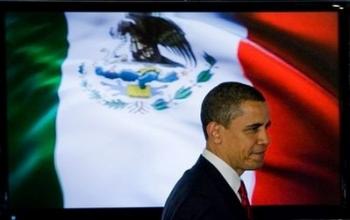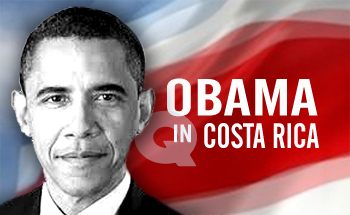COHA Research: Partners Not Enemies

At the present time, President Obama is in Mexico dialoging with Enrique Peña Nieto.
The U.S. Latino population is growing at a pace faster than all other groups, so every day the United States is becoming more Latin Americanized. Yet, the Obama administration has not even begun to develop a concrete strategy of how to approach Latin American and Caribbean states. Moreover, the U.S.-Latin America relationship has been deteriorating for some time now, such that the United States is not a member of the majority of the regional organizations, including CELAC (Community of Latin American and Caribbean States) and Caricom.
President Barack Obama will be visiting Mexico and Costa Rica on May 2-4, first meeting with Mexican President Enrique Peña Nieto on today (May 2), and then attending a regional summit, hosted by Costa Rica’s President Laura Chinchilla, accompanied by the five other members of the Central American Integration System (SICA, Sistema de Integración Centroamericana) on Friday, May 3.
Obama is stopping in Mexico to address issues arising from the pending battle over U.S. immigration reform legislation and the push for increased border security. The Costa Rica leg of the trip demonstrates that the problems of migration, violence, drug trafficking, and citizen security are not just bilateral but regional as well.
The trip offers a chance to redirect U.S. policy. It is long past time for the United States to begin to reassess its disappointing, and often failed, policies towards Latin America, in order to build instead more mutually respectful and beneficial relationships with its increasingly independent neighbors. However, the current regional context does not look all that promising for the Obama administration. For example, the United States is the only member of the Organization of American States, besides Paraguay, that has not accepted Nicolás Maduro’s victory in Venezuela’s April 14 elections, which was publicly validated by OAS Secretary General Jose Miguel Insulza.
Historically, U.S. regional policy has been characterized by imperial abuses, from the Monroe Doctrine, Gun Boat diplomacy, Dollar Diplomacy, and Cold War containment. Yet despite this abrasive and conflictive history, most Latin Americans actually favor stronger economic ties with the United States, due to the strength of its markets and the pull of its economy.
Meanwhile, the State Department will soon be releasing its annual terrorist list, and the international community is waiting to see if Cuba will finally be taken off. This step would signal a conscious effort by the Obama administration to improve binational relations with the small Caribbean island.
Obama faces a changed context in the Americas. Asia and Latin America have been continuously increasing their ties, challenging U.S. interests in the region. Especially strong are China’s demands for Latin American commodities. This emerging Pacific Alliance has helped to mitigate some of the effects of the 2008 global recession in Latin American countries, which are no longer as dependent economically on the United States.
So, Obama’s first Latin American tour since his reelection represents a new opportunity to repair strained relations between the too often imperious North and the rest of the Americas. Still, many fear that Obama may just extend the neo-Cold War policies of his predecessor, George W. Bush, and further alienate other American states. That is, will this visit be more than just a diplomatic handshake?
In Mexico, Obama will be looking to deepen its economic partnership and to amplify other forms of bilateral cooperation. Given the prevailing instability in the Middle East and Northern Africa, the United States is aiming, as a long-term strategy, to import energy from sources closer to home, and Mexico is a likely partner since the country is already one of the top oil exporters to the country.
On the other hand, there exists a real possibility that the developing E.U.-U.S. free trade agreement could expand into an E.U.-NAFTA trade agreement. Such transatlantic partnerships would not only help the United States to negotiate with a trade bloc but also put Mexico in a better position globally. The May 2 meeting is an opportunity for Obama to send a message to Mexico that he is serious about deepening U.S. commercial ties with Latin America.

A rising concern for Central America is the dramatic increase in narcotrafficking through the region. Obama will likely make new security commitments in order to beef up U.S. anti-drug efforts in both Mexico and in Central America. However, under Obama the United States has continued its controversial policy of funding the Honduran police and military forces responsible for the endless string of kidnappings, tortures, killings, and an array of other human rights abuses. In the Bajo Aguán area of Honduras, exhumations began on April 25, as researchers comb through clandestine graves for the remains of disappeared persons. Former U.S.-backed Guatemalan dictator, Efraín Rios Montt, and his chief intelligence officer, José Mauricio Rodriguez Sánchez, returned to trial on Tuesday. It is heartening that at least in this case the United States has correctly urged that the trial be as “transparent and impartial” as possible.
Obama would do well to realize that drug trafficking is not the only source of violence in the region. The administration needs to bring international awareness to the other causes of violence, and concentrate on helping to seek solutions that can provide the local inhabitants in the violence-torn nations of Mexico, Guatemala, El Salvador, and Honduras with safer communities in which to raise their families, as well as more opportunities that will allow them to achieve socioeconomic mobility. President Obama should also be guarded over what he to say about his host nations. Latin Americans do not prefer to think of themselves as living in “America’s backyard” as Secretary of State John Kerry put it.
And Latin Americans, in return, need to better understand the United States. Latin American leaders need to be more aware of Washington’s dysfunctional political processes that slow down aid to the region and prevent any new immigration reform bill from being passed and implemented
The trip by Obama could open a new era in U.S.-Latin American relations, but only if leaders from both sides can overcome some deep misunderstandings and have the courage to set aside failed policies of the past, and work together to find solutions that would serve shared U.S.-Central American interests in peace, poverty reduction, and democracy. It is time for Obama to lead in this direction. Not only must the U.S. president learn to take sufficient interest in the needs and aspirations of Latin America, but he has failed to act in a manner that would portray him as a responsible policymaker and tell the U.S. nation that there can be no serious regional relationship if Washington doesn’t resolve its differences with Cuba.
Kimberly Bullard is a Research Associate at the Council on Hemispheric Affairs
Please accept this article as a free contribution from COHA, but if re-posting, please afford authorial and institutional attribution. Exclusive rights can be negotiated.
For additional news or analysis on Latin America, please go to: Latin News

